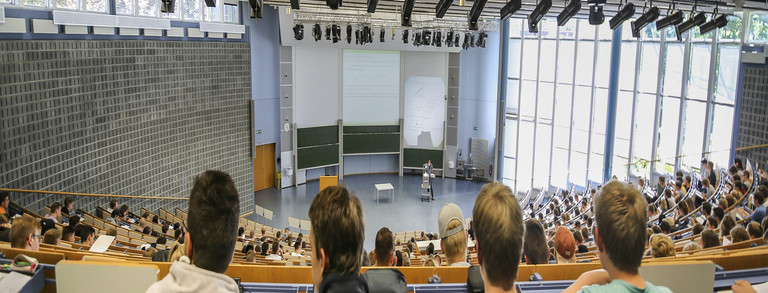Master (1 subject)
How can people acquire several languages at the same time or one after the other? What does multilingualism mean for an individual’s identity? And what is the impact of multilingualism on society and education policy? These are some of the questions tackled in the Master’s program in Empirical Multilingualism Research. It is run jointly by TU Dortmund University and Ruhr-Universität Bochum and deals with the various aspects of multilingualism – currently a hot topic in society. The program combines linguistics, language and philology and has a strong focus on empirical linguistics research.
to the degree program Empirical Multilingualism Research (Master of Arts (M.A.))
The Master’s degree program in Industrial Engineering deepens the knowledge gained through Bachelor’s studies in the fields of mechanical engineering, electrical engineering, and economics and at the same time, through its scientific focus, prepares the graduate to pursue a doctoral degree.
to the degree program Industrial Engineering (Master of Science (M.Sc.))
The international Master’s degree program in Industrial Mathematics is an English-language specialization of the Master’s degree program Technomathematics. The combination of pure and in particular applied mathematics (numerics, optimization, scientific computing) together with many computer science components (also from data science) and with applications from natural sciences and engineering in the minor subject represents a very modern and also internationally attractive course of study and is thus very appealing in particular for foreign students.
to the degree program Industrial Mathematics (Master of Science (M.Sc.))
The Master of Journalism Studies is the continuation of a university education geared toward highquality journalism. The focus of the one-year course is the intensive examination of current journalistic topics from a practical and academic perspective. The close connection between practice and theory enables in-depth academic reflection and discussion of practical professional questions
and challenges.
to the degree program Journalism Studies (Master of Arts (M.A.))
Logistics ensures that companies and entire economies can control incoming and outgoing flows of material, information, energy, and even people. From procurement to production, distribution, and disposal, it cuts across all functional areas along the supply chain. Next to technology and business management, the most important tools are IT systems, teamwork, and leadership skills.
The Master of Science in Manufacturing Technology (MMT) focuses on the analysis of advanced manufacturing problems, with emphasis on the combination of scientific-theoretical courses and experimental industrial test setups. The Master’s degree program, conducted entirely in English, offers outstanding, motivated, and dedicated students an excellent university education in a research-based setting with industry collaborations. You can also experience intercultural exchange with your fellow students from all over the world.
to the degree program Manufacturing Technology (MMT) (Master of Science (M.Sc.))
The Master’s degree program in mathematics prepares students professionally for challenging jobs in business and industry or in the public sector.
to the degree program Mathematics (Master of Science (M.Sc.))
Important facts about Master's programs (1-subject)
- The master's degree is the second qualifying university degree. As a rule, a bachelor's degree has already been successfully completed in advance.
- The standard period of study in the Master's program is at least one and at most two years.
- Depending on the course of study, TU Dortmund University awards the degrees Master of Science (M.Sc.) and Master of Arts (M.A.).
- Within the scope of the 1-subject Master's degree, you will study one course of study.
- The Master's degree enables you to pursue a doctorate.





![[Translate to English:] Partner Four hands are holding the green logo of TU Dortmund University](/storages/tu_website/_processed_/1/d/csm_Partner_Nicole_Rechmann_KW_40b35bb3fd.jpg)




![[Translate to English:] Forschung An apparatus with tubes in a laboratory](/storages/tu_website/_processed_/0/c/csm_Forschung_Juergen_Huhn_cbd34afd6d.jpg)
![[Translate to English:] Studium Five students are sitting in a lecture hall. They are talking to each other.](/storages/tu_website/_processed_/c/9/csm_Studium_FelixSchmale_81d94adc86.jpg)





